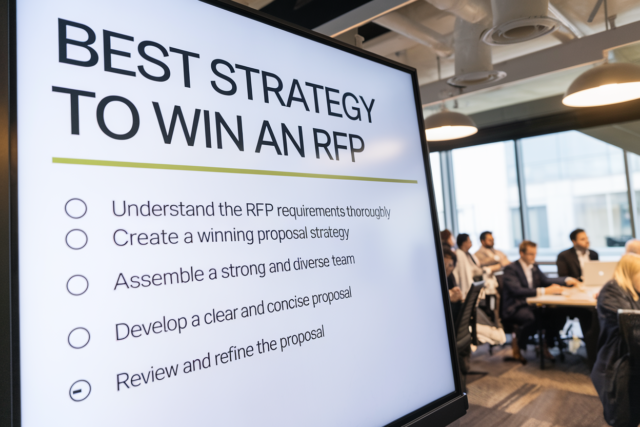
Small consulting firms can use several strategies to compete with big firms in Request for Proposals (RFPs). These strategies focus on leveraging unique strengths and addressing potential weaknesses.
Table of Contents
- 1 Highlight Specialized Expertise to Compete with Big Firms in RFPs
- 2 Offer Personalized Service
- 3 Demonstrate Agility and Flexibility
- 4 Leverage Local Knowledge
- 5 Collaborate with Other Small Firms
- 6 Focus on Cost-Effectiveness
- 7 Emphasize Innovation
- 8 Showcase Past Performance
- 9 Highlight Certifications and Accreditations
- 10 Offer Unique Pricing Models
- 11 Provide Faster Turnaround Times
- 12 Use Technology Effectively
- 13 Focus on Niche Markets
- 14 Emphasize Quality Control
- 15 Offer Comprehensive Solutions
- 16 Demonstrate Thought Leadership
Highlight Specialized Expertise to Compete with Big Firms in RFPs
Small consulting firms can leverage their specialized expertise to compete effectively with big firms in RFPs. This strategy allows smaller companies to stand out in areas where they excel.
Focus on Niche Knowledge: Small firms often possess deep knowledge in specific sectors or technologies. They should emphasize this expertise in their RFP responses.
Example: A boutique cybersecurity consultancy bidding for a financial institution’s security audit can highlight its team’s extensive experience in fintech security protocols and compliance requirements.
Showcase Unique Solutions: Small firms can present innovative approaches that larger competitors might overlook. They should detail how their specialized knowledge translates into unique, effective solutions for the client’s specific challenges.
Example: A small environmental consulting firm responding to an RFP for sustainable urban planning can emphasize its proprietary methodology for integrating green spaces in high-density areas, backed by successful case studies.
Emphasize Adaptability: Small firms can often apply their specialized knowledge more flexibly than larger organizations. They should highlight their ability to tailor their expertise to the client’s specific needs.
Example: A niche marketing consultancy can describe how they adapted their industry-specific strategies to help a client enter a new market segment, resulting in significant growth. By focusing on these aspects of specialized expertise, small consulting firms can position themselves as valuable alternatives to larger competitors in the RFP process.
Offer Personalized Service
Small firms can provide more individualized attention to clients. This personal touch can be a significant advantage.
Example: A boutique marketing consultancy can promise direct access to senior consultants for all client meetings. They can contrast this with the often multi-layered approach of larger firms where junior staff handle day-to-day interactions.
Demonstrate Agility and Flexibility
Small firms can adapt quickly to changing client needs. This flexibility can be attractive to potential clients.
Example: A small business strategy firm can highlight its ability to adjust project scopes mid-engagement without lengthy approval processes. They can provide examples of past projects where they quickly pivoted to address unexpected challenges.
Leverage Local Knowledge
For projects requiring local expertise, small firms with strong community ties can have an edge.
Example: A small urban planning consultancy can emphasize its deep understanding of local zoning laws and relationships with city officials when bidding for a municipal development project.
Collaborate with Other Small Firms
Small firms can team up to offer a broader range of services, competing more effectively with larger firms.
Example: A small IT consulting firm can partner with a cybersecurity specialist and a data analytics firm to bid on a comprehensive digital transformation project.
Focus on Cost-Effectiveness
Small firms often have lower overhead costs. They can pass these savings on to clients.
Example: A small financial advisory firm can offer competitive pricing for a corporate restructuring project by highlighting its lean operating model and absence of expensive office space in prime locations.
Emphasize Innovation
Small firms can often implement new ideas more quickly than larger organizations.
Example: A small HR consulting firm can showcase its use of cutting-edge AI tools for talent assessment, positioning itself as more innovative than traditional large firms.
Showcase Past Performance
Strong testimonials and case studies can help small firms build credibility. Example: A small operations consulting firm can include detailed case studies in its RFP response, showing measurable improvements in efficiency and cost savings for previous clients.
Highlight Certifications and Accreditations
Professional certifications can level the playing field with larger firms.
Example: A small environmental consulting firm can emphasize its staff’s specialized certifications in environmental impact assessment when bidding for a government sustainability project.
Offer Unique Pricing Models
Creative pricing structures can make small firms more attractive to potential clients.
Example: A small marketing consultancy can offer a performance-based pricing model, where a portion of their fee is tied to achieving specific marketing KPIs.
Provide Faster Turnaround Times
Small firms can often complete projects more quickly than larger competitors.
Example: A small software development consultancy can commit to shorter project timelines in their RFP response, highlighting their ability to start work immediately without the delays often associated with larger firms.
Use Technology Effectively
Leveraging technology can help small firms compete with the resources of larger organizations.
Example: A small financial consulting firm can showcase its use of advanced data analytics tools to provide insights comparable to those offered by larger firms with more extensive research departments.
Focus on Niche Markets
Specializing in specific industries or types of projects can give small firms a competitive edge.
Example: A small consulting firm focusing exclusively on renewable energy projects can position itself as the go-to expert for solar and wind farm developments.
Emphasize Quality Control
Small firms can often maintain higher quality standards due to closer oversight.
Example: A small engineering consultancy can highlight its rigorous quality control processes, emphasizing that all work is reviewed by senior engineers, unlike in larger firms where junior staff may have more autonomy.
Offer Comprehensive Solutions
Small firms can differentiate themselves by offering end-to-end solutions.
Example: A small IT consulting firm can offer to handle everything from initial assessment to implementation and ongoing support for a client’s digital transformation project.
Demonstrate Thought Leadership
Publishing industry insights can help small firms build credibility and visibility.







